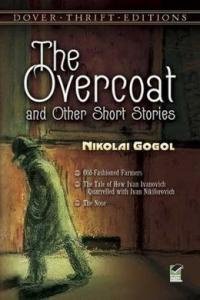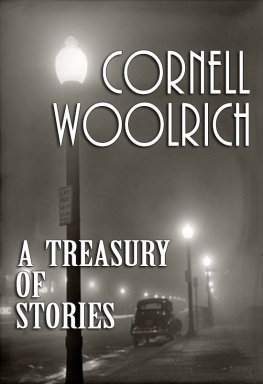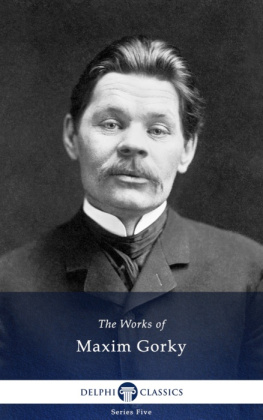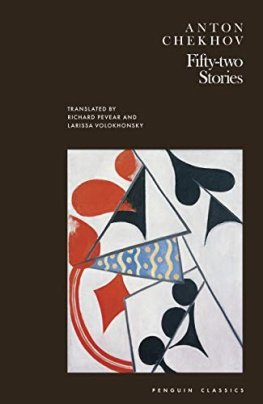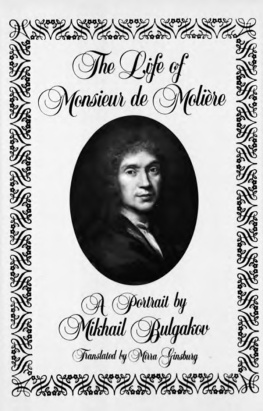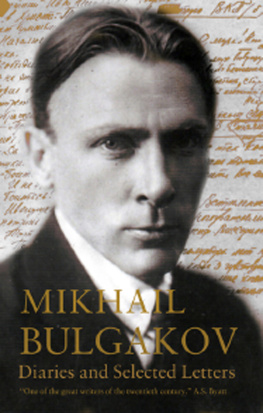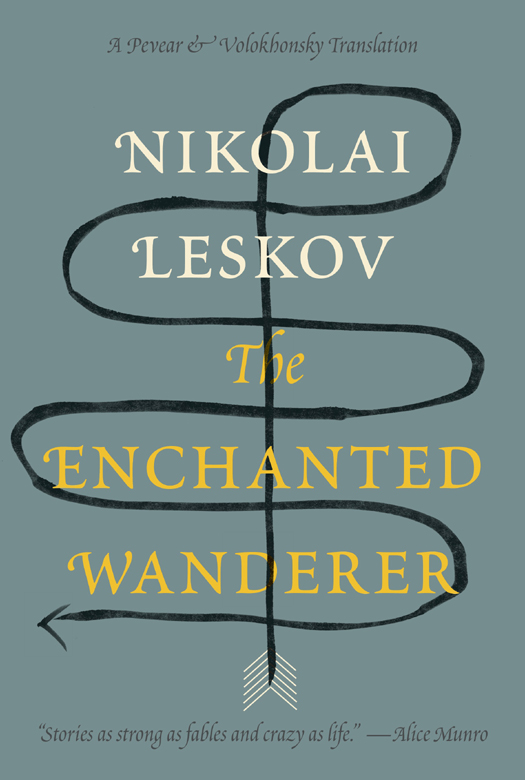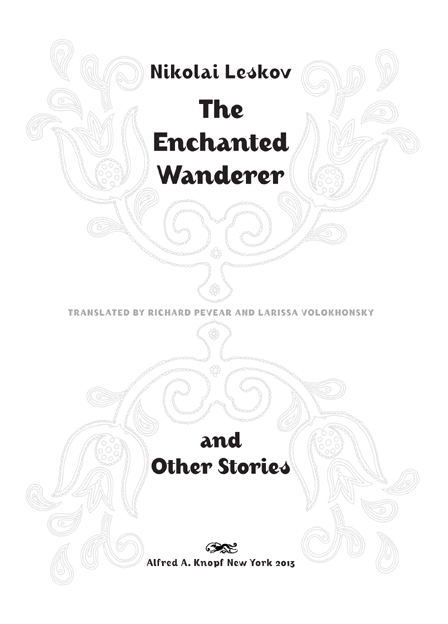The Enchanted Wanderer
and Other Stories
This Is a Borzoi Book
Published by Alfred A. Knopf
Translation copyright 2013 by Richard Pevear and Larissa Volokhonsky
Introduction copyright 2013 by Richard Pevear
All rights reserved. Published in the United States by Alfred A. Knopf, a division
of Random House, Inc., New York, and in Canada by Random House of Canada
Limited, Toronto. Originally published in Great Britain, in somewhat different
form, by Impress Books Ltd., Devon, in 2012.
www.aaknopf.com
Knopf, Borzoi Books, and the colophon are registered trademarks of Random House, Inc.
Portions of this work were originally published in the following: The Pearl
Necklace and A Flaming Patriot in The Hudson Review (Summer 2011); The
Lady Macbeth of Mtsensk in The Hudson Review (Winter 2012); and The
Spirit of Madame de Genlis in The Threepenny Review (Winter 2013).
Library of Congress Cataloging-in-Publication Data
Leskov, N. S. (Nikolai Semenovich), 18311895.
[Works. English. Selections. 2013]
The enchanted wanderer and other stories / by Nikolai Leskov; translated by
Richard Pevear and Larissa Volokhonsky.
pages ; cm
Includes bibliographical references.
eISBN: 978-0-307-96236-2
I. Pevear, Richard, [date], translator. II. Volokhonsky, Larissa, translator. III. Title.
PG3337.L5A255 2013
891.733dc23
2012025416
This is a work of fiction. Names, characters, places, and incidents either are the
product of the authors imagination or are used fictitiously. Any resemblance to
actual persons, living or dead, events, or locales is entirely coincidental.
Jacket design by Peter Mendelsund
v3.1
Contents
Introduction
Leskov is a writer who yields enormous pleasure, breaking past sectarian literary and ideological premises. But more: we live in a moment of lowered cultural and emotional expectations, after the fall of modernism but with nothing very strong to replace it. To go back to certain earlier writers is to regain a sense of human possibility. To go back to Leskov is to regain a sense of the passion, sometimes the joy, that can be part of the human enterprise.
IRVING HOWE , JUSTICE FOR LESKOV
I
Nikolai Leskov, a younger contemporary of Dostoevsky and Tolstoy and one of the great masters of Russian fiction, is a writer who keeps being discovered. The first to discover him was Leskov himself. He was in his late twenties and working as a business agent for his uncle, a Russianized Scotsman named Alexander Scott, whose firm managed the vast estates of two noble Russian families. Leskov later described those years, from 1857 to 1859, as the best period of his life. He traveled all over Russia, from the Black Sea to the White and from Brod to Krasny Yar, and sent back reports in the form of letters to his uncle. I had no need to clear myself a path to the people through books and ready-made ideas, he later wrote. I studied them in place. Books were a precious help to me, but I was the helmsman. Hence Im not rooted in any school, because it was not in school that I learned, but on Scotts barges. These travels gave him a great store of impressions that he drew upon all his life. Scott was struck by the literary quality of Leskovs reports and used to read them aloud to his neighbors, one of whom praised them so highly that it gave Leskov the idea of becoming a writer. As he commented rather drily in a third-person Note on Himself thirty years later: His writing began by chance.
He was born in the village of Gorokhovo, near the town of Orel (pronounced Oryl), in 1831. Orel, located in the Russian heartland, the so-called wooden Russia, some two hundred and twenty miles southwest of Moscow, is the setting of five of the seventeen stories in the present collection. Another is set in Mtsensk, which is in the Orel region, and five more take place in other provincial Russian towns. This preponderance of the provincial is typical of Leskovs work as a whole, though, as the reader will see, he could also tell sophisticated and witty stories set in Petersburg, Moscow, Vienna
On his fathers side, Leskov came from several generations of priests serving the village of Leski, which gave them their family name. His father, too, received a seminary education, but he broke with tradition and entered government service in the Orel courts, eventually attaining the rank of collegiate assessor, which conferred hereditary nobility. His mother was from an impoverished aristocratic family: her father, a Moscow nobleman who had lost everything during the French invasion in 1812, worked as an estate manager in Gorokhovo; her mother, of whom Leskov gives us a fine portrait in the last chapter of Deathless Golovan, was of Moscow merchant stock and, as Leskov says, was taken in marriage into a noble family not for her wealth, but for her beauty. Leskov thus combined in himself the three estatesnoble, mercantile, and clericalbut in oddly mixed and attenuated forms.
He first came to know the fourth estate, the peasants (serfs at that time), in 1839, when his father gave up his position as a magistrate in Orel and bought the small country estate of Panino, in the Kromy district, twenty miles from Orel. This move and some of the experiences it led to are described in the opening chapters of his story The Spook. The knowledge of peasant life he acquired then, later enriched by his travels for Alexander Scott, differed greatly from the abstractions of radical social theory that were becoming fashionable in Moscow and Petersburg.
Leskovs formal schooling was limited to the five years, from 1841 to 1846, he spent at the secondary school in Orel. He later wrote that he was terribly bored but studied well, but in fact he was a mediocre student, and at the age of fifteen he left school without finishing and went into civil service as a clerk in the Orel criminal court. In 1848 his father died during an outbreak of cholera, leaving his mother to manage the little estate at Panino and raise seven children, of whom he was the eldest. In 1849 his maternal uncle, Sergei Petrovich Alferiev, a doctor in Kiev and a professor at the university, invited him to visit. Leskov was greatly impressed by the city and decided to stay. He took a leave from his post in Orel and by February of 1850 had been accepted as a junior clerk in the Kiev military recruitment office. This close experience of the workings of Russian bureaucracy and of the fate of conscripts (the term of military service at that time was twenty-five years) would reappear again and again in his writing.
Leskov spent eight years in Kiev, made friends with students and professors at the university through his uncle, sat in on courses, read widely, learned Ukrainian and Polish, and incidentally witnessed the building of the famous Nikolaevsky Chain Bridge over the Dniepr River, designed by the Anglo-Irish engineer Charles Blacker Vignoles. This was the first multi-span suspension bridge in Europe and at the time the longest in the world. The workers and the work on the bridge have a central place in his story The Sealed Angel (1873), and though he deliberately avoids naming the city, the setting is vividly evoked. The directors of the actual project were English, as in Leskov, and Vignoless letters and papers (which, of course, Leskov never saw) describe the same natural disasters, the floods and ice damage, that play such a major part in the story. In 1853, the year that the bridge was officially opened, Leskov married Olga Smirnova, the daughter of a Kiev merchant.


